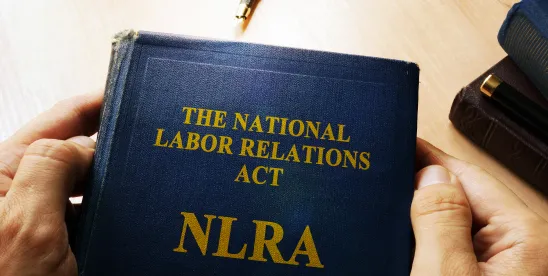On November 26, 2024, the National Labor Relations Board’s (“NLRB” or the “Board”) General Counsel, Jennifer Abruzzo, released GC Memorandum 25-02 to all Regional Directors, Officers-in-Charge, and Resident Officers, seeking to ensure that settlement agreements based on unfair labor practice allegations adequately address the public rights implicated by potential violations of the National Labor Relations Act (“NLRA” or the “Act”).
Background
As previously reported here, GC Memorandum 25-02 follows the Board’s August 22, 2024, decision in Metro Health Inc., which effectively eliminated the use of consent orders to resolve unfair labor practice (“ULP”) charges. Consent orders allowed respondents to propose resolutions that could be approved by the Board even without the consent of the charging party. Before Metro Health Inc., consent orders would be approved if they “substantially remedied” the alleged violations and were deemed reasonable.
In the absence of these orders, GC Abruzzo indicated that respondents in ULP disputes may be more inclined to settle directly with charging parties—over the General Counsel’s objections—once the administrative hearing has begun. This is because only prior to the start of the administrative hearing does the General Counsel have full prosecutorial discretion to dismiss a charge, including through settlement, or to issue complaint.
GC Memorandum 25-02 was issued to address this fear through educating Regional personnel, parties to ULP claims, administrative law judges, and the general public on the Board’s “decades of insistence” that settlement agreements effectively address the “public rights” implicated by ULP allegations. GC Abruzzo therefore called upon Regional personnel to “vigorously” object to settlement agreements that fail to do so.
The Board’s History of Public Rights Considerations in Settlement Agreements
The Memorandum provided a history of the Board’s considerations regarding the adequacy of settlements, beginning with its 1987 Independent Stave Co. decision. In that case, the Board clarified its interest in promoting settlement along with its equal interest in promoting public rights.
The Board listed four factors that should be considered when judging settlement agreements:
- which parties agreed to the settlement and the GC’s position regarding the settlement;
- the reasonableness of the settlement considering the violation alleged, the risks inherent in litigation, and the stage of the litigation;
- whether fraud or coercion influenced the settlement; and
- the respondent’s history of violations of the Act or breach of prior settlement agreements.
GC Abruzzo further cited to Board law involving Independent Stave’s four-prong standard, which “repeatedly reference[s] public rights and the public interest” in the context of settlement agreements. As a result, GC Abruzzo opined that settlement agreements must advance the public interest by “address[ing] the financial and chilling effects of unfair labor practices on unnamed individuals, including non-charging party discriminatees and a respondent’s workforce as a whole.”
These considerations are captured within the first and second Independent Stave factors. For the first factor, GC Abruzzo indicated that “the position taken by the General Counsel” on settlement agreements must contemplate the General Counsel’s duty to “vindicate[] the public interest” in enforcing the Act. For the second factor, GC Abruzzo stated that a settlement that fails to address all of the harms caused by the ULPs—including public rights and the public interest—may not be “reasonable in light of the nature of the violations alleged.”
After reciting the Board’s history concerning public rights considerations in settlements, GC Abruzzo reiterated the Supreme Court’s acknowledgment of the Board’s power to give full effect to the policy of the NLRA. According to GC Abruzzo, this includes a commitment to “encouraging mutually agreeable settlements” that are “in the public interest” and not simply in vindication of private rights. GC Abruzzo directed Regions to ensure that parties engaging in settlement negotiations are aware that the Board can and will reject private settlements that are repugnant to the NLRA, and further directed Board agents to ensure that judges are aware of the factors of Independent Stave and its progeny.
Takeaways
Unlike NLRB precedent or rulemaking, GC Memoranda—like the one discussed here—do not have the effect of changing Board law. Further, the NLRB GC and the Board’s overall prosecutorial goals are likely to change soon after President Trump’s inauguration on January 20, 2025. Therefore, GC Abruzzo’s call to consider public rights in GC Memorandum 25-02 could be limited in its effect.
However, GC Memorandum 25-02 still provides important insight into how settlement agreements might be evaluated by the Board’s Regional Offices under existing precedent. In the wake of Metro Health Inc., GC Abruzzo is attempting to foreclose a potential work-around for respondents in settling ULP charges after the start of the hearing, once the GC loses full prosecutorial discretion. In doing so, GC Abruzzo seeks to put all relevant parties on notice of her position that the public interest is a necessary consideration in the approval of settlement agreements. This could make it more difficult to obtain approval of ULP settlements, as Board Regions and administrative law judges are urged to further scrutinize private settlement agreements under public rights considerations.
We will continue to update these developments as Regions act on the GC’s Memorandum.
Jake Lee also contributed to this article.



 />i
/>i
